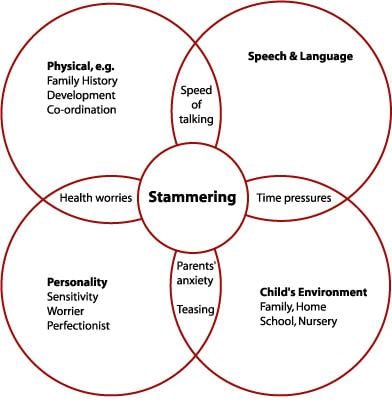
Help Prevent Stuttering/Stammering
Here are some things that may happen to your talking - things that you might do when you stammer:
You may just keep repeating ("p-p-p-p-please"), sometimes the whole word is repeated ("my-my-my-my-my name is")
You may also find that a sound just keeps on going and you can't move on to the next bit of the word, "ssssssssee what I mean?" It is a bit like stretching a sound out
Perhaps you find that the word or the beginning sound gets completely stuck, and nothing comes out at all "!!!". When this happens, the other person might not even know that you are trying to speak. It can be very frustrating and embarrassing
Stammering interrupts talking. It is like tripping up in your own mouth and sometimes, like tripping up, you can "save yourself" and sometimes it feels impossible
It feels as if you can't help it - it just happens - sometimes it happens without any warning and other times it happens on particular words or at important moments
You may have developed clever tricks to stop it happening. For example, finding a different word that isn't so hard or putting an extra word or sound in first. At other times you might just avoid the word or the situation altogether
Whatever you do you may be trying to stop the stammer getting in your way
There are other things that happen because of the stammering:
Stammering can be very tiring. It takes a lot of energy (both physical and mental), your breathing can be difficult and you may find that you tense up some muscles in your neck, mouth, chest or hands and body
It is often embarrassing and frustrating, and you may find that in some situations you get nervous about speaking
Maybe you think that other people will be feeling sorry for you or, worse still, that some people might find it funny. Sometimes you may even think that you know exactly what others are thinking. That will make you try harder to stop the stammering and of course the harder you try to stop the stammer, the worse it usually gets. This is called a vicious cycle. Most people who stammer will know this feeling
Causes of Stuttering
Experts don't know for sure what causes stuttering in a child, but most believe that the speech disorder occurs as the result of a variety of factors. They may include one or more of the following:
Genetics. Most experts agree that stuttering has a genetic component. Sixty percent of all people who stutter have a close family member who also stutters.
Developmental stuttering. Many young children go through a period of stuttering beginning at the age of 18 months to 2 years, as they hone their speech and language skills. This form of stuttering is usually temporary.
Neurological factors. Research has found that people who stutter process language differently than those without the speech disorder. In some cases, there seems to be a problem in the way language is transmitted through the brain. Scientists don't know exactly why this occurs.
Risk Factors for Stuttering
How do you know whether a stuttering child has a temporary developmental problem, or a more serious speech disorder that warrants intervention? According to the Stuttering Foundation, the following factors put your child at greater risk:
Family. Your child is at higher risk if he or she has one or more family members who stutter in adulthood.
Age. Children who begin stuttering before they reach age 3½ are more likely to outgrow it.
Length of time stuttering persists. If your child's stuttering habit lasts longer than 6 months, it is less likely that he or she will outgrow it.
Gender. Boys are three to four times as likely as girls to stutter.
Other speech and language deficits. If your child has other problems speaking and being understood, it is less likely that he will outgrow his stutter.
 Cart
Cart  Checkout
Checkout